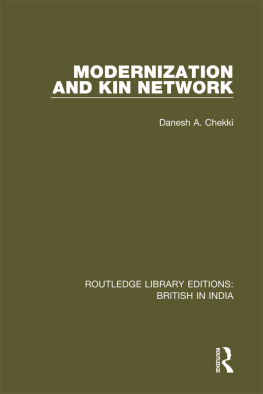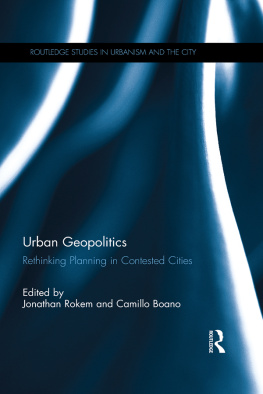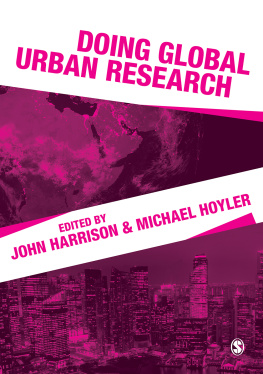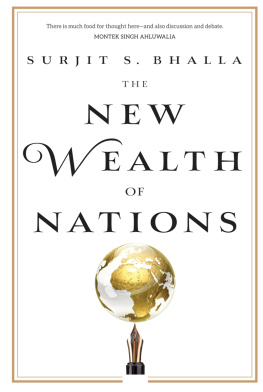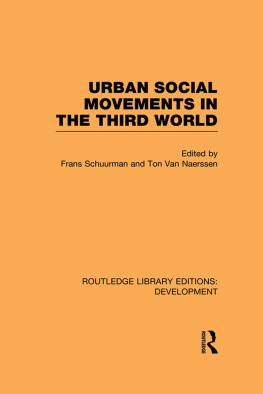ROUTLEDGE LIBRARY EDITIONS: BRITISH IN INDIA
Volume 17
Modernization and Kin Network
First published in 1974 by E. J. Brill
This edition first published in 2017
by Routledge
2 Park Square, Milton Park, Abingdon, Oxon OX14 4RN
and by Routledge
711 Third Avenue, New York, NY 10017
Routledge is an imprint of the Taylor & Francis Group, an informa business
1974 Danesh A. Chekki
All rights reserved. No part of this book may be reprinted or reproduced or utilised in any form or by any electronic, mechanical, or other means, now known or hereafter invented, including photocopying and recording, or in any information storage or retrieval system, without permission in writing from the publishers.
Trademark notice: Product or corporate names may be trademarks or registered trademarks, and are used only for identification and explanation without intent to infringe.
British Library Cataloguing in Publication Data
A catalogue record for this book is available from the British Library
ISBN: 978-1-138-22929-7 (Set)
ISBN: 978-1-315-20179-5 (Set) (ebk)
ISBN: 978-1-138-70498-5 (Volume 17) (hbk)
ISBN: 978-1-138-70510-4 (Volume 17) (pbk)
ISBN: 978-1-315-20237-2 (Volume 17) (ebk)
Publishers Note
The publisher has gone to great lengths to ensure the quality of this reprint but points out that some imperfections in the original copies may be apparent.
Disclaimer
The publisher has made every effort to trace copyright holders and would welcome correspondence from those they have been unable to trace.
MONOGRAPHS AND THEORETICAL STUDIES IN SOCIOLOGY AND ANTHROPOLOGY IN HONOUR OF NELS ANDERSON
General Editor: K. Ishwaran
Publication 7
Modernization and Kin Network
DANESH A. CHEKKI
WITH A FOREWORD by K. ISHWARAN
ADVISORY COMMITTEE
J. C H EN , (York University, Toronto, Canada)
P. C. W. G UTKIND , (McGill University, Montreal, Canada)
J. ON EILL , (York University, Toronto, Canada)
M INDA A. B OJIN (Editorial Assistant)
ISBN 90 04 03922 8
Copyright 1974 by E. J. Brill, Leiden, The Netherlands
All rights reserved. No part of this book may be reproduced or translated in any form, by print, photoprint, microfilm, microfiche or any other means without written permission from the publisher.
PRINTED IN THE NETHERLANDS
To my Parents
Foreword
Kinship, Modernization and the Populistic Model in Karnataka
K. Ishwaran
I AM VERY HAPPY to introduce this timely and valuable monograph on modernization and kinship in Karnataka by D. A. Chekki. Chekki belongs to the younger generation of sociologists in Karnataka with some of whose work I was associated while I was Chairman of the Department of Social Anthropology and Sociology, Karnataka University, Dharwar, Karnataka State. This monograph was to have been part of a comprehensive and long-term research project on the society and culture of North Karnataka that I had planned, but, as things turned out, this remains the only tangible outcome of that project, at any rate, for the moment.
Chekkis focus of study is Dharwar, a medium-sized town in Karnataka, with a population of around a hundred thousand. Essentially an educational and cultural centre, unlike the more busy and commercial city of Hubli, just twelve miles away, Dharwar has occupied, and still occupies, a central place in the educational, cultural and literary development of North Karnataka. In 1963, however, Dharwar and Hubli were amalgamated into a single municipal corporation. It has a full-fledged university, a radio station, and such culturally active organizations as the Karnataka Vidyavardhaka Sangha (a pioneer in the revival of Kannada literary scholarship). Therefore, Chekkis study is an important contribution to the understanding of the socio-cultural growth of modern Karnataka, the land of the Kannada-speaking people.
To appreciate adequately Chekkis study, one should place it in the broader theoretical perspective of Indian sociology as a whole. It would be no exaggeration to suggest that this study throws light on an aspect of Indian social processes that has been hardly touched by the dominant tradition in Indian sociological research today, bogged down as it has been in general concepts like the Great Tradition or Sanskritization. I am not suggesting that these concepts have been of no help or that they should be abandoned. Far from it, I am only arguing that even to use these concepts meaningfully one needs to make a radical shift in research emphasis as well as in theoretical framework. To be more specific, there is now a greater need for a more careful and detailed examination of the complex heterogeneity and pluralism of Indias socio-cultural reality. This means, in operational terms, an increasing focus on regional socio-cultural patterns and processes. It is only after a reasonable accumulation of such regionally-oriented studies that one can see in sharper relief and significance such all-India phenomena as the Great Tradition, Sanskritization, and modernization.
Studies such as this are now a prime necessity to restore a balance in Indian sociology between grand abstract theory and detailed accounts of concrete, local, socio-cultural structures, processes and patterns. Chekkis work illustrates that, even within a part of a linguistic region, there are different models of modernization. Addressing himself to the specific areas of kinship and family, he demonstrates that the pattern of kinship modernization for the two key caste groups in the area, the Brahmans of Gokul and the Lingayats of Kalyan, was different but also related to an overall process of modernization. Rightly locating the main parameter of this process in the fact that the Lingayats, as a community, are more rurally-oriented, Chekki finds that, in some ways, the Brahmans appeared to be modernizing at a slightly faster rate. At the same time he draws attention to the more modern and egalitarian aspects of the Lingayat tradition, both in ideological and institutional terms, which include equality between the sexes, emphasis on individual self-effort and achievement-orientation, and emphasis on a cultural system securely embedded in the life of the common people. Hence, the situation he presents and analyses is complex and demands a complex theoretical explanation.
In what follows, I shall propose certain theoretical models and provide a broad framework that might hopefully yield a better theoretical insight into this complexity. Though Chekki does not elaborate on these aspects, they are implicit in his account. Since his concern was quite specific and limited, he does not go into the theoretical issues raised by what he regards as differential rates of modernization between the Brahmans and Lingayats. In my view, a fuller appreciation of the significance of this finding is possible only if we talk not in terms of differential rates of social change but of different models of social change.
The Lingayat Model of Modernization as a Populistic Model
The history of the Lingayat community in Karnataka goes back to the twelfth century. Its founder, Basava, was very much in advance of his times when he offered to his followers a programme of radical restructuring of society and culture on the basis of what can now be seen as an explicit ideology of universalistic humanism. He proposed a model of society and culture that challenged the existing Brahmanical model of a Sanskritized, caste-hierarchical social order. Thus, the Lingayat tradition of modernization can claim to be one of the oldest in India. Basava backed up his ideology with an organizational structure that underpinned his popular, reformist movement. The original ideology of Lingayat socio-cultural reform involved: (1) a shift in the basis of social structure from the principle of hierarchy to a principle of equality, including the equality of sexes; (2) a shift in the ideology from an institutionalized downgrading of manual labour to an elevation of it in moral terms (the notion of Kay aka ), implying a work ethic of the kind Weber identified in Calvinism; and (3) a cultural shift from Sanskrit to Kannada, the language of the local people, as the language of culture and ritual. In religious terms, this programme could be called a Protestant version of Hinduism and, in sociological terms, an ideology of modernism.

